20XX状语从句9种
(完整版)状语从句9种全
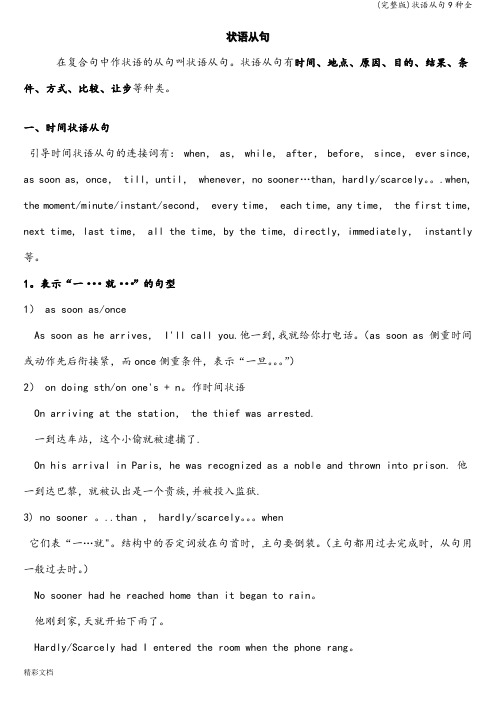
状语从句在复合句中作状语的从句叫状语从句。
状语从句有时间、地点、原因、目的、结果、条件、方式、比较、让步等种类。
一、时间状语从句引导时间状语从句的连接词有: when, as, while, after, before, since, ever since, as soon as, once, till, until, whenever, no sooner…than, hardly/scarcely。
.when, the moment/minute/instant/second, every time, each time, any time, the first time, next time, last time, all the time, by the time, directly, immediately, instantly 等。
1。
表示“一···就···”的句型1) as soon as/onceAs soon as he arrives, I'll call you.他一到,我就给你打电话。
(as soon as 侧重时间或动作先后衔接紧,而once侧重条件,表示“一旦。
”)2) on doing sth/on one's + n。
作时间状语On arriving at the station, the thief was arrested.一到达车站,这个小偷就被逮捕了.On his arrival in Paris, he was recognized as a noble and thrown into prison. 他一到达巴黎,就被认出是一个贵族,并被投入监狱.3) no sooner 。
..than , hardly/scarcely。
when它们表“一…就"。
结构中的否定词放在句首时,主句要倒装。
完整版英语语法状语从句的归纳总结
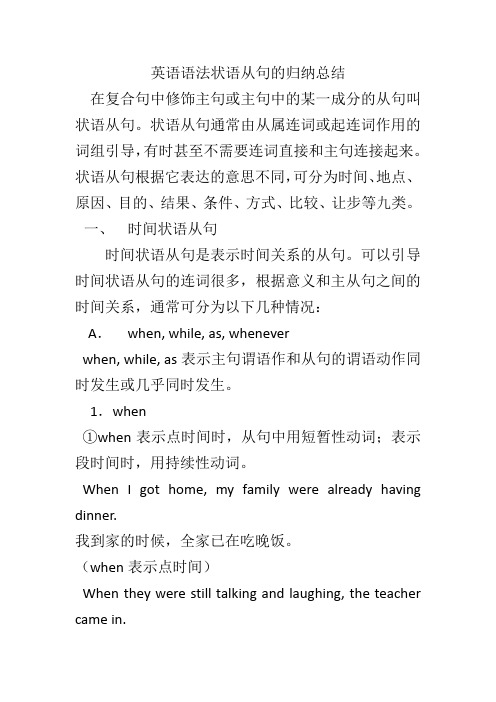
英语语法状语从句的归纳总结在复合句中修饰主句或主句中的某一成分的从句叫状语从句。
状语从句通常由从属连词或起连词作用的词组引导,有时甚至不需要连词直接和主句连接起来。
状语从句根据它表达的意思不同,可分为时间、地点、原因、目的、结果、条件、方式、比较、让步等九类。
一、时间状语从句时间状语从句是表示时间关系的从句。
可以引导时间状语从句的连词很多,根据意义和主从句之间的时间关系,通常可分为以下几种情况:A.when, while, as, wheneverwhen, while, as表示主句谓语作和从句的谓语动作同时发生或几乎同时发生。
1.when①when表示点时间时,从句中用短暂性动词;表示段时间时,用持续性动词。
When I got home, my family were already having dinner.我到家的时候,全家已在吃晚饭。
(when表示点时间)When they were still talking and laughing, the teacher came in.当他们还在说笑的时候,老师进来了。
(when表示段时间)He waved a hello when he saw her.当他看见她的时候,就挥手打了个招呼。
(when表示点时间)When you think you know nothing, you begin to know something.当你认为自己一无所知的时候,就开始知道一些事情了。
(when表示段时间)注意:当when意思是正当……时候(and at that moment)时,when只能跟在前一分句之后。
He was about to go to bed when the doorbel rang.他正要上床,忽然门铃响了。
They were watching the World Cup when suddenly the lights went out.他们正看着世界杯比赛,突然灯灭了。
英语中的九种状语从句
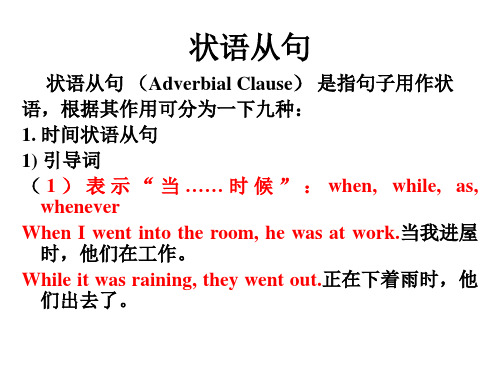
5、条件状语从句的引导词有if, if only(如果…… 就好了,但愿), unless, in case, as/so long as, provided that, providing that, suppose that, supposing that, on condition that , when。
(1)___the days went on, the weather got worse.
A. With
B. Since
C. While D. As
(2) ____the satellite launch drawing near,the research workers put their hearts to the test and always stayed up late.
状语从句
状语从句 (Adverbial Clause) 是指句子用作状 语,根据其作用可分为一下九种:
1. 时间状语从句 1) 引导词 ( 1 ) 表 示 “ 当 …… 时 候 ” : when, while, as,
whenever When I went into the room, he was at work.当我进屋
Even if I have to walk all the way I’ll get there. 即使我 得一路走着去,我也要走到那里。
• as引导的让步状语从句的结构是:名词(形 容词、副词、动词)+ as +主谓。如:
Child as he was, he knew what was the right thing to do. 尽管是个孩子,他知道要做的正确的事情 是什么。
20XX中考英语状语从句专题复习含答案解析
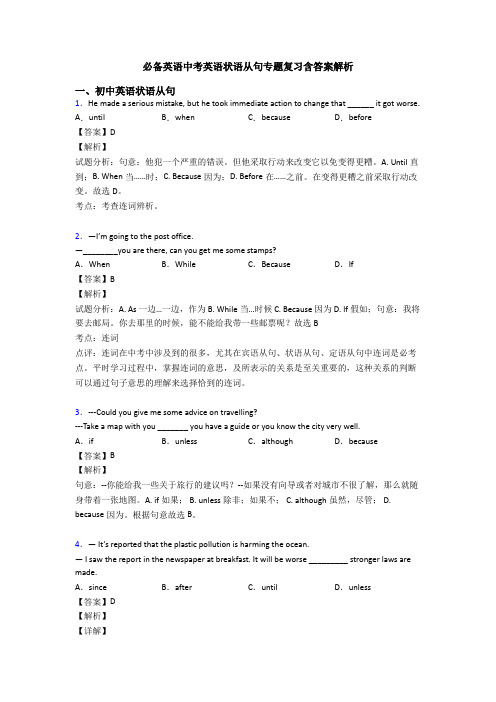
必备英语中考英语状语从句专题复习含答案解析一、初中英语状语从句1.He made a serious mistake, but he took immediate action to change that ______ it got worse. A.until B.when C.because D.before【答案】D【解析】试题分析:句意:他犯一个严重的错误。
但他采取行动来改变它以免变得更糟。
A. Until直到;B. When当……时;C. Because因为;D. Before在……之前。
在变得更糟之前采取行动改变。
故选D。
考点:考查连词辨析。
2.—I’m going to the post office.—________you are there, can you get me some stamps?A.When B.While C.Because D.If【答案】B【解析】试题分析:A. As 一边…一边,作为 B. While当…时候 C. Because 因为 D. lf假如;句意:我将要去邮局。
你去那里的时候,能不能给我带一些邮票呢?故选B考点:连词点评:连词在中考中涉及到的很多,尤其在宾语从句、状语从句、定语从句中连词是必考点。
平时学习过程中,掌握连词的意思,及所表示的关系是至关重要的,这种关系的判断可以通过句子意思的理解来选择恰到的连词。
3.---Could you give me some advice on travelling?---Take a map with you _______ you have a guide or you know the city very well.A.if B.unless C.although D.because【答案】B【解析】句意:--你能给我一些关于旅行的建议吗?--如果没有向导或者对城市不很了解,那么就随身带着一张地图。
英语状语从句的九种类型举例
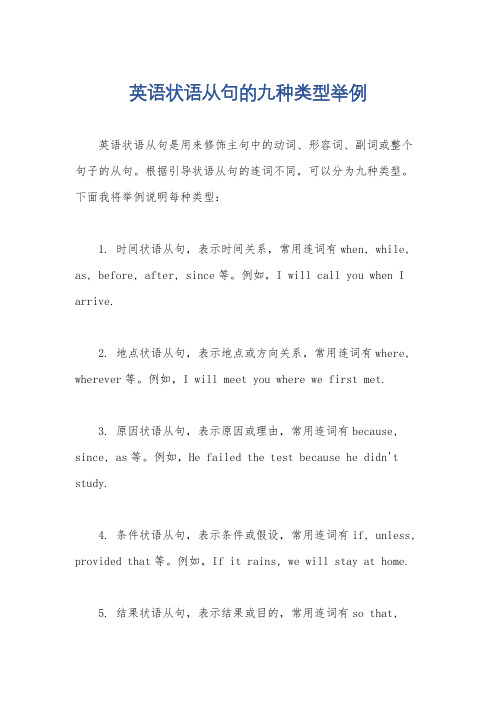
英语状语从句的九种类型举例英语状语从句是用来修饰主句中的动词、形容词、副词或整个句子的从句。
根据引导状语从句的连词不同,可以分为九种类型。
下面我将举例说明每种类型:1. 时间状语从句,表示时间关系,常用连词有when, while, as, before, after, since等。
例如,I will call you when I arrive.2. 地点状语从句,表示地点或方向关系,常用连词有where, wherever等。
例如,I will meet you where we first met.3. 原因状语从句,表示原因或理由,常用连词有because, since, as等。
例如,He failed the test because he didn't study.4. 条件状语从句,表示条件或假设,常用连词有if, unless, provided that等。
例如,If it rains, we will stay at home.5. 结果状语从句,表示结果或目的,常用连词有so that,such that等。
例如,She worked hard so that she could pass the exam.6. 方式状语从句,表示方式或方法,常用连词有as, as if, as though等。
例如,She sang as if she were a professional singer.7. 比较状语从句,表示比较关系,常用连词有than, as, as...as等。
例如,He is taller than I am.8. 让步状语从句,表示让步关系,常用连词有though, although, even if等。
例如,Although it was raining, we went out.9. 目的状语从句,表示目的或意图,常用连词有in order that, so that等。
英语语法状语从句的归纳总结
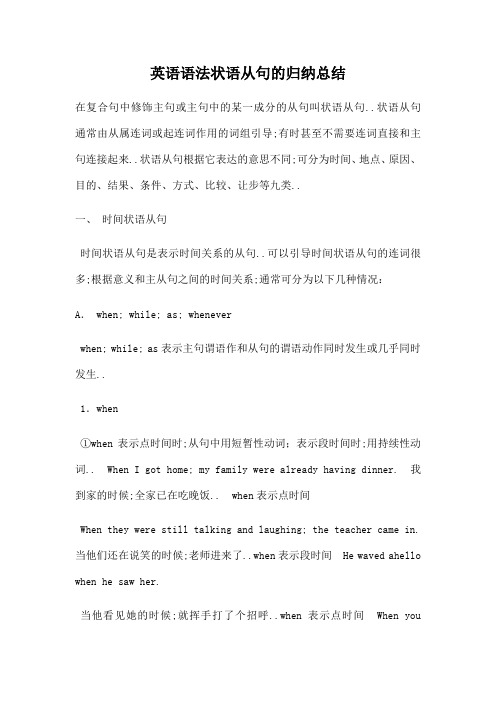
英语语法状语从句的归纳总结在复合句中修饰主句或主句中的某一成分的从句叫状语从句..状语从句通常由从属连词或起连词作用的词组引导;有时甚至不需要连词直接和主句连接起来..状语从句根据它表达的意思不同;可分为时间、地点、原因、目的、结果、条件、方式、比较、让步等九类..一、时间状语从句时间状语从句是表示时间关系的从句..可以引导时间状语从句的连词很多;根据意义和主从句之间的时间关系;通常可分为以下几种情况:A. when; while; as; wheneverwhen; while; as表示主句谓语作和从句的谓语动作同时发生或几乎同时发生..1.when①when表示点时间时;从句中用短暂性动词;表示段时间时;用持续性动词.. When I got home; my family were already having dinner. 我到家的时候;全家已在吃晚饭.. when表示点时间When they were still talking and laughing; the teacher came in. 当他们还在说笑的时候;老师进来了..when表示段时间 He waved ahello when he saw her.当他看见她的时候;就挥手打了个招呼..when表示点时间 When youthink you know nothing; you begin to know something. 当你认为自己一无所知的时候;就开始知道一些事情了..when表示段时间注意:当when意思是正当……时候and at that moment时;when只能跟在前一分句之后.. He was about to go to bed when the doorbel rang. 他正要上床;忽然门铃响了..They were watching the World Cup when suddenly the lights went out. 他们正看着世界杯比赛;突然灯灭了..They had just arrived home when it began to rain. 他们刚到家;天就开始下雨了..②有时when表示虽然;尽管的含义;相当于although或since.. He walks when he might take a taxi. 尽管可以打的;但他还是步行..How can you hope for mercy yourself when you show none既然你不宽恕别人;你自己又怎能希望得到别人的宽恕呢2.while①while通常表示一段时间;从句中宜用持续性动词作谓语..Strike while the iron is hot. 趁热打铁..She fell asleep while she was reading the newspaper. 她在看报的时候睡着了..②while有时可以作并列连词;表示对比;可译成……而…….. I am fond of English while he likes maths. 我喜欢英语而他却喜欢数学.. We slept while the captain kept watch. 我们睡觉而上尉担任警戒..③while有时可引导让步状语从句;意思是虽然.. While they love te children; they are strict with them. 虽然他们都爱他们的孩子;但却对他们要求严格.. 提示:虽然during 与 while 意思很相近;但是during是介词;不能引导从句.. 3.as①as表示点时间时;从句中用短暂性动词;表示段时间时;用持续性动词..as和when两者经常可以通用..The thief was caught as when he was stealing in the supermarket. 小偷在超市行窃时被逮住了..I saw Jim as when he left the meeting room. 吉姆离开会议室时候我看到了他..②as表示一边……一边……;强调从句和主句中两个动作交替进行或同步进行.. They talked as they walked. 他们边走边聊..He looked behind from time to time as he went. 他一边走;一边不时地往后看.. ③as表示随着As time goes on; it's getting warmer and warmer. 随着时间的推移;天气变得越来越暖了..As spring warms the earth; al flowers begin to bloom. 随着春回大地;百花开始绽放..4.when; while; as的用法区别①只有当从句表示的是段时间;即其谓语动词有持续性特征时;这三者可以通用互换.. I got the news on the radio when while as I was having breakfast. 我在吃早饭的时候从收音机里获悉这一消息.. ②在下列情况下;三者彼此之间不能替换使用:a.as更强调同一时间或紧接的一前一后或伴随着的变化.. We listened to the singer sing as he played the guitar. 我们听着歌星边弹吉它边演唱..I thought of it just as you opened your mouth. 你一张嘴我就知道你要说什幺As he grew older; he became less and less active.随着他年龄的增长;他变得越来越不活泼了..提示:状语从句可放在主句之前或之后;放在主句之前时一般用逗号与主句分开..有时可置于主句中间;前后用逗号..b.when更强调特定时间;还可表示从句中的动作先于或后于主句的动作..When I had given Mary the spare ticket; I found my own already gone. 当我把多余的票给了玛丽时;我才发现我自己的票已不知去向..从句动作发生在主句之前;注意主从句的时态When I finally got there; he meeting had been on for ten minutes. 当我最终赶到那里时;会议已开始十分钟了..从句动作发生在主句之后;注意时态 c.while从句只能表示延续的动作或状态或主从句中动作的对比.. She thought I was talking about her daughter; while in fact;I was talking about my daughter.她以为我在谈论她女儿;而事实上;我在谈论我的女儿..d.若表示两个短促动作几乎同时发生时;用as场合多于when.. As he finished his speech; the audience burst into applause. 他结束讲话时;观众爆发出雷鸣般的掌声..5.wheneverwhenever是when的强势语;它描述的不是一次性动作;而是经常发生的习惯性动作.. You are always welcome whenever you come. 无论你何时来都欢迎..Whenever we met with diffiulties; they came to help us. 每当我们遇上困难的时候;他们就来帮我们..B. before; after1.beforebefore表示在一段时间之前..I must finish all the work before go home. 回家之前我必须干完所有的活..You must first learn to walk before you try to run. 在想要跑以前;你得先学会走..He had learned English for three years before he went to London. 他去伦敦之前已学了三年英语.. 提示: before 从句往往带有否定的含义.. He ran off before I could stop him.我还没来得及阻止他;他就跑掉了.. Thke it down berore you forget it. 趁着还没忘记的时候就记录下来..。
九大状语从句的英文表达

九大状语从句的英文表达1. 时间状语从句 (Adverbial clause of time):- When he arrived, everyone was already there.- I will call you as soon as I finish my work.2. 地点状语从句 (Adverbial clause of place):- Wherever she goes, she always takes her camera.- I will meet you at the park where we used to play.3. 原因状语从句 (Adverbial clause of cause/reason):- Since it"s raining, we should stay indoors.- The game was canceled because of bad weather.4. 结果状语从句 (Adverbial clause of result):- The car broke down, so we had to call for a tow truck. - He studied really hard, therefore, he got excellent grades.5. 条件状语从句 (Adverbial clause of condition):- If it rains, we will have to cancel the picnic.- Unless you hurry, you will miss the train.6. 目的状语从句 (Adverbial clause of purpose):- I am studying hard so that I can get into a good university.- He took extra classes in order to improve his English speaking skills.7. 方式状语从句 (Adverbial clause of manner):- She wrote the letter as if she was in a hurry.- They danced like nobody was watching.8. 比较状语从句 (Adverbial clause of comparison):- She is taller than I am.- He runs faster than his brother.9. 消息状语从句 (Adverbial clause of reported speech): - He told me that he would be late for the meeting.- She said that she was feeling tired.。
状语从句的九种常见类型精编版
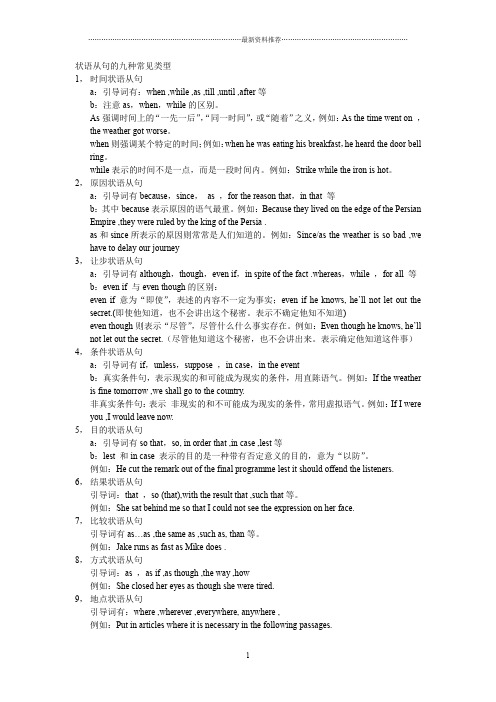
……………………………………………………………最新资料推荐…………………………………………………状语从句的九种常见类型1,时间状语从句a:引导词有:when ,while ,as ,till ,until ,after等b:注意as,when,while的区别。
As强调时间上的“一先一后”,“同一时间”,或“随着”之义,例如:As the time went on ,the weather got worse。
when则强调某个特定的时间;例如:when he was eating his breakfast,he heard the door bell ring。
while表示的时间不是一点,而是一段时间内。
例如:Strike while the iron is hot。
2,原因状语从句a:引导词有because,since,as ,for the reason that,in that 等b:其中because表示原因的语气最重。
例如:Because they lived on the edge of the Persian Empire ,they were ruled by the king of the Persia .as和since所表示的原因则常常是人们知道的。
例如:Since/as the weather is so bad ,we have to delay our journey3,让步状语从句a:引导词有although,though,even if,in spite of the fact .whereas,while ,for all 等b:even if 与even though的区别:even if 意为“即使”,表述的内容不一定为事实;even if he knows, he’ll not let out the secret.(即使他知道,也不会讲出这个秘密。
- 1、下载文档前请自行甄别文档内容的完整性,平台不提供额外的编辑、内容补充、找答案等附加服务。
- 2、"仅部分预览"的文档,不可在线预览部分如存在完整性等问题,可反馈申请退款(可完整预览的文档不适用该条件!)。
- 3、如文档侵犯您的权益,请联系客服反馈,我们会尽快为您处理(人工客服工作时间:9:00-18:30)。
1.时间状语从句常用引导词:when, as, while, as soon as, before, after, since , till, until 特殊引导词:the minute, the moment, the second, every time, the day,theinstant, immediately , directly, no sooner …than, hardly …when, scarcely …whenI didn't realize how special my mother was until I became an adult. While John was watching TV, his wife was cooking.The children ran away from the orchard(果园), the moment they saw the guard.No sooner had I arrived home ,then it began to rain.Every time I listen to your advice, I get into trouble.2.地点状语从句常用引导词:where特殊引导词:wherever, anywhere, everywhereGenerally, air will be heavily polluted where there are factories. Wherever you go, you should work hard.地点状语从句§4地点状语从句(adverbial clause of place)地点状语从句一般由连接副词where, wherever等引导,已经形成了固定的句型,例如:句型1:Where+地点从句,(there)+主句。
【注意】此句型通常译成“哪里……哪里就……”;主句在从句后面时,there可用可不用;如果主句在从句的前面时,一般都不用there。
例如:1 / 15Where there is no rain, farming is difficult or impossible.在没有雨水的地方,耕作是困难的,或根本不可能的。
You should have put the book where you found it. 你本来应该把书放回原来的地方。
Where the Communist Party of China goes, there the people are liberated.哪里有了中国共产党,哪里人民得解放。
句型2:Anywhere/ wherever+地点从句,+主句。
【注意】anywhere本身是个副词,但是,常可以引导从句,相当于连词,意思相似于wherever, anywhere引导的从句可位于主句之前,也可以位于主句之后。
而wherever本身就是个连词,表示“在何处,无论何处”。
例如:Wherever the sea is , you will find seamen.有海就有海员。
3回答者:快乐如3.原因状语从句常用引导词:because, since, as, for特殊引导词:seeing that, now that, in that, considering that, given that.My friends dislike me because I'm handsome and successful.4.目的状语从句常用引导词:so that, in order that特殊引导词:lest, in case, for fear that,in the hope that, for the purpose that,to the end thatThe boss asked the secretary to hurry up with the letters so that he could signthem.The teacher raised his voice on purpose that the students in the back could hearmore clearly.2 / 155.结果状语从句常用引导词:so …that, such …that,特殊引导词:such that, to the degree that, to the extent that, to such a degreethat,He got up so early that he caught the first bus.It's such a good chance that we must not miss it.To such a degree was he excited that he couldn't sleep last night.6.条件状语从句常用引导词:if, unless,特殊引导词:as/so long as, only if, providing/provided that, supposing that, incase that, on condition thatWe'll start our project if the president agrees.You will certainly succeed so long as you keep on trying.Provided that there is no opposition, we shall hold the meeting here. 7.让步状语从句常用引导词:though, although, even if, even though特殊引导词:as(用在让步状语从句中必须要倒装),while ( 一般用在句首),no matter …,in spite of the fact that, while, whatever, whoever, wherever,whenever, however, whicheverMuch as I respect him, I can't agree to his proposal.尽管我很尊敬他,我却不同意他的建议。
The old man always enjoys swimming even though the weather is rough.3 / 15No matter how hard he tried, she could not change her mind.He won't listen whatever you may say.8.比较状语从句常用引导词:as(同级比较), than(不同程度的比较)特殊引导词:the more …the more …; just as …,so…; A is to B what /as X isto Y; no …more than; not A so much as BShe is as bad-tempered as her mother.The house is three times as big as ours.The more you exercise, the healthier you will be.Food is to men what oil is to machine. 食物之于人,犹如油之于机器。
9.方式状语从句常用引导词:as, as if, how特殊引导词:the wayWhen in , do as the Roman do.She behaved as if she were the boss.Sometimes we teach our children the way our parents have taught us. 三、条件状语从句要点:表示状语从句由连词if, unless (=if not) 引导。
1.If it doesn't rain tomorrow, we will go hiking.如果明天不下雨, 我们就去远足.2.You will get good grades if you study hard.4 / 15如果你努力学习,就会取得好成绩.3.I will go to the party unless he goes there too.我会去参加聚会的, 除非他也去.(如果他不去,我就去.)4.You will be late unless you leave immediately.如果你不马上走,你将会迟到的.(=If you don't leave immediately, you will belate.)难点提示:用条件状语从句时要注意时态的正确使用,当主句是将来时的时候,从句要用一般现在时.lHe will not leave if it isn't fine tomorrow.一般将来时,一般现在时lThey are going to have a picnic if it doesn't rain next week.一般将来时, 一般现在时.难点——because , since , as , for,辨析1)because语势最强,用来说明人所不知的原因,回答why提出的问题。
当原因是显而易见的或已为人们所知,就用as或since。
I didn't go, because I was afraid.Since /As the weather is so bad, we have to delay our journey.2)由because引导的从句如果放在句末,且前面有逗号,则可以用for来代替。
但如果不是说明直接原因,而是多种情况加以推断,就只能用for。
He is absent today, becaus e / for he is ill.He must be ill, for he is absent today.3) as和for的区别:5 / 15通常情况下,as引导的从句在主句前,for引导的从句在主句后。
例:As the weather is cold, I stay at home.(同义句)I stay at home, for the weather is cold.五、目的状语从句要点:目的状语从句由连词that, so that, so…that , in order that 引导。
